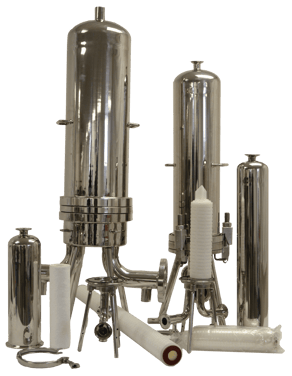
In its simplest terms, a filtration system isolates one substance from another. They can be as rudimentary as a strainer used to filter pasta from boiling water or as complex as a metropolitan water treatment plant. However a filter is used, it’s important that you use the right type of filter for the job; otherwise, mishaps will occur. (You wouldn’t use a colander with wide holes to drain a small pasta like orzo, would you?)
Filtration systems are used in a variety of industries, from purifying foods and beverages to pharmaceuticals to oil and gas, and chemicals. In nearly every industry, water is typically one of the primary substances that require filtration. Having pure water, free of dirt and other contaminants is a necessity when producing a safe, consistent product.
Mixed Filter Housing Types & Functions
There are several kinds of filter housings, commonly described by the type of filter they employ: bag and cartridge. Both types of filters separate sediment from fluid. In a bag filter, liquid flows through small, permeable pores, capturing debris and impurities in the bag filter as it passes through. The size of the contaminants removed depends upon the micron size of the pores. Bag filters are able to filter large amounts of fluid and/or chemicals at a high flow rate. They generally have more surface area than cartridge filters.

Keep in mind that bag filters don’t actually “fill up” like a vacuum bag. The pores of a bag filter will plug up on the surface or at the bottom of the bag, just like a cartridge filter.
Speaking of cartridge filters, this type of filter relies upon either a pleated fabric or a screen to filter the liquid, trapping sediment in the process. Cartridge filters typically work in one of two ways: With surface cartridge filters, particles are retained on the surface. Depth cartridge filters use multiple layers that retain debris at all levels. Cartridge filters are easy to use and maintain and work well in industries where ultra-pure water filtration is required because they can be produced in ultra-small micron sizes and varying lengths. 
Generally, the larger the micron size of your filter, the higher the flow capacity. Some industries require minuscule particles to be filtered (less than 1 micron), which can lead to frequent clogging. That’s why it’s important to recognize the kind of filter—bag or cartridge and micron size—before purchasing a filter and/or filter housing.
Cartridge and/or bag filters are one-time-use products and can be disposed of or recycled when they outlast their effectiveness. There’s only a certain lifespan for every filter type, depending on its use, so filter changes at manufacturer-recommended intervals are an important part of maintaining an effective filtration system.
Dixon Quality Bag & Cartridge Filters

Dixon offers both bag and cartridge filtration housings and replacements. Dixon Sanitary’s FH-Series Filter Housings are used for separating solid matter from the liquid in the food processing, beverage, dairy, wineries and breweries, personal care products, and chemical markets. “It’s a far cleaner housing than a standard industrial cartridge or bag housing,” says Mathew Bender, sales engineer at Dixon Sanitary. “The main difference is that [FH-Series Filters] offer drain ports so you can completely drain the housing. We offer food-grade gaskets in the equipment and you can take apart and clean every aspect of the housings.”
In industrial or sanitary settings, Dixon’s DF-Series filters use a polypropylene material with a retention rating of 99.98 percent to remove contaminants like dirt, hair, rust particles, or anything larger than 1 micron out of the system.
Dixon sanitary or industrial filters can be found in nearly all industries that utilize filtration systems, from oil and gas to wineries and breweries.
All Dixon replacement filters are manufactured in the United States and can be dispatched within a day’s time. Currently, Dixon offers more than 100 part numbers—and growing—as part of our filtration system catalog to satisfy every customer need. We’re also happy to offer crossover products to fit other manufacturers’ filter housings and can work with customers to custom-manufacture filters for virtually any use. “In terms of configurations we can offer,” says Bender, “it’s pretty endless.”
For more information about Dixon filtration systems, call and talk to a specialist at 800.789.1718 or visit dixonvalve.com


